Further details can be found in the conference program here: https://www.conftool.com/educon/sessions.php.
This presentation starts with a discussion on the profound technological changes that have taken place around us during the last two decades, supported by the new disruptive advances both on the software and the hardware sides. In recent years, in an attempt to change the whole format of industrial automation, these developments have been taken further, especially in Germany, under the label “Industry 4.0” that has recently evolved into “Industry 5.0.” Such engineered systems are named Cyber Physical Systems that are built from, and depends upon, the seamless integration of computational algorithms and physical components. The dominant feature of the changes is the integration of the virtual world with the physical world through the Internet of Things (IoT). The most recent development is the radical paradigm shift from “connected things'' to “connected intelligence.'' After reviewing these profound changes, the presentation concentrates on education. A brief history of engineering education is presented, and the recent paradigm changes are discussed, which essentially stress that skills must prevail over degrees to deal with the challenges posed by the trends of the fifth industrial revolution.
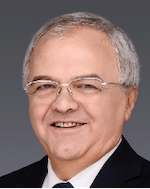 Okyay Kaynak received the B.Sc. degree with first class honors and Ph.D. degrees in electronic and electrical engineering from the University of Birmingham, UK, in 1969 and 1972 respectively.
Okyay Kaynak received the B.Sc. degree with first class honors and Ph.D. degrees in electronic and electrical engineering from the University of Birmingham, UK, in 1969 and 1972 respectively.
From 1972 to 1979, he held various positions within the industry. In 1979, he joined the Department of Electrical and Electronics Engineering, Bogazici University, Istanbul, Turkey, where he is currently a Professor Emeritus, holding the UNESCO Chair on Mechatronics. He is also a 1000 People Plan Professor at University of Science & Technology Beijing, China. He has hold long-term (near to or more than a year) Visiting Professor/Scholar positions at various institutions in Japan, Germany, U.S., Singapore and China. His current research interests are in the broad field of intelligent systems. He has authored three books, edited five and authored or co-authored more than 450 papers that have appeared in various journals and conference proceedings.
Dr. Kaynak has served as the Editor in Chief of IEEE Trans. on Industrial Informatics and IEEE/ASME Trans. on Mechatronics as well as Co-Editor in Chief of IEEE Trans. on Industrial Electronics. Additionally, he is on the Editorial or Advisory Boards of a number of scholarly journals. He received the Chinese Government’s Friendship Award and Humboldt Research Prize (both in 2016). Most recently, in 2020, he was awarded the Academy Prize of Turkish Academy of Sciences.
People are becoming more connected as the globe gets increasingly globalised and diversified. It is beneficial for educators or researchers to learn about the most recent and popular educational approaches. Novel Educational technology can be a powerful tool for enhancing students' interest in many learning domains when it is well implemented. This presentation is about Educational Technology (EdTech) challenges and applications in the context of new normal of inclusive education, from a bird-eye view angle. EdTech is quickly becoming a vital commercial approach in critical inclusive education projects. Education is supposingly to be for all without any prejudice on any disabilities or any differences. Thematic review of modern educational technologies in new normal of inclusive education field is presented. The contents will spark serious discussion regarding developments in technology, business, and education in the coming years.
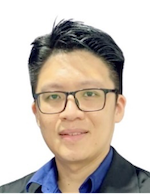 Chee has more than 12 years of experience as high school teacher with PhD in Educational Technology in Faculty of Education, Universiti Teknologi Malaysia, Johor, Malaysia. He is in the top 30 Microsoft Innovative Educator Expert in Malaysia in 2020. Previously, he worked at high performing secondary school as teacher and then promoted recently as Asisstant Director at Educational Technology and Resources Division, Ministry of Education, Malaysia. Hence, Know a lot of the issues in the educational industry. Currently, Chee is a senior lecturer in Universiti Pendidikan Sultan Idris. He is a registered professional Technologist under Malaysian Board of Technologist with title Ts. Apart from that, he is a senior member of Institute of Electrical and Electronics Engineers (IEEE). Chee has experience too as part-time lecturer in Universiti Malaya as well. He published 9 quality journal paper with ISI-indexed and scopus-indexed. His research interest focuses on mobile learning, educational technology, and computer-based learning as well as design and develops mobile learning environment and application. Chee would also like to examine how it can affect the student in many ways. Innovation in teaching and learning also become his interest recently especially in this pandemic era. His research H-index is 4 with 193 citations in just 5 years. With humble, Chee is one of the winners as Global Teacher Award 2020. He is a reviewer for many ISI and Scopus indexed journals. He is also a jury for many prestigious innovation competitions at international and national level such as United Kingdom Previously, Chee has been a speaker in virtual international conference in United States of America and India.
Chee has more than 12 years of experience as high school teacher with PhD in Educational Technology in Faculty of Education, Universiti Teknologi Malaysia, Johor, Malaysia. He is in the top 30 Microsoft Innovative Educator Expert in Malaysia in 2020. Previously, he worked at high performing secondary school as teacher and then promoted recently as Asisstant Director at Educational Technology and Resources Division, Ministry of Education, Malaysia. Hence, Know a lot of the issues in the educational industry. Currently, Chee is a senior lecturer in Universiti Pendidikan Sultan Idris. He is a registered professional Technologist under Malaysian Board of Technologist with title Ts. Apart from that, he is a senior member of Institute of Electrical and Electronics Engineers (IEEE). Chee has experience too as part-time lecturer in Universiti Malaya as well. He published 9 quality journal paper with ISI-indexed and scopus-indexed. His research interest focuses on mobile learning, educational technology, and computer-based learning as well as design and develops mobile learning environment and application. Chee would also like to examine how it can affect the student in many ways. Innovation in teaching and learning also become his interest recently especially in this pandemic era. His research H-index is 4 with 193 citations in just 5 years. With humble, Chee is one of the winners as Global Teacher Award 2020. He is a reviewer for many ISI and Scopus indexed journals. He is also a jury for many prestigious innovation competitions at international and national level such as United Kingdom Previously, Chee has been a speaker in virtual international conference in United States of America and India.
Nowadays, we had passed the 4 waves/ages. Before 1970 various businesses could affect educational technologies. Since we reached the 70ies the educational technologies and IoT became able to change and improve the businesses, even our lives. IoT based educational economy/business make this educational engineering procedure faster, safer with higher productivity even possible. AI, IoT and other new technologies as well as knowledge in combination of reality and virtual reality build a new concept named Education 5.0 (Edu 5.0) changes the paradigm from traditional to modern to get prepared for the future concern. These technologies would create smart education; however, barriers cause challenges to apply these IoB-education technologies and create modern areas like MOOCs. It is required to indicate these barriers and find out solutions to apply them. Based on the 5th wave/tomorrow age theory or theory of comprehensive everything, today’s challenges and tomorrow’s crises have been discussed that in our world of that technology development and rapid growing made ever quickening change, the human mind is threatened by shattering. Proper solutions and policies could make educators to deal with new challenges for the future education. This theory could be a comprehensive strategy to find out solutions to deal with such challenges, even to tackle tomorrow’s crises for mapping the future education. It is vital to deal with them to maintain the nature and humanity. The theory illustrates the educational SMEs from SME 3.0 to SME 5.0 which we call it Edu 5.0. It has been invented by Prof. Dr. Hamid Doost Mohammadian theoretician of the 5th wave theory (2010-17) and it is about proceeding of future of I4.0 and future of Society5.0 and edge of tomorrow which is mentioned from 2020-2030. Modern educational SMEs that are not only concerned on business, but also CSR strategies, improving sustainability. This Edu 5.0 is a concept though the 5th wave theory which is a kind of educational sustainability with seven pillars of sustainability (7PS model) based on 9PSG model (nine pillars of sustainable governance) on being to make the word as a better place for living.
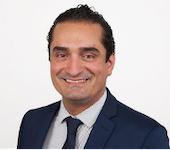 Prof. Dr. Dr. h.c. Hamid Doost Mohammadian (Germany) is a professor for international management and sustainability and senior Futurist in Germany. He is director for international management, consultant to president and head of FHM German Institute of SMEs (F-GISI) at University of Applied Sciences (FHM) in Germany.
Prof. Dr. Dr. h.c. Hamid Doost Mohammadian (Germany) is a professor for international management and sustainability and senior Futurist in Germany. He is director for international management, consultant to president and head of FHM German Institute of SMEs (F-GISI) at University of Applied Sciences (FHM) in Germany.
He obtained his Post-Doc in Global SMEs Management, and two doctorates in business strategy and sustainability management & also an honorary doctorate in international sustainable development management, master in industrial engineering – productivity and system management and a Bachelor of Computer Hardware Engineering. He obtained two honorary professorships titles in Global SME Management and in International Technology Management and Entrepreneurship.
He is also an external Professor and supervisor at some international high rank universities like the TU-Campus EUREF gGmbH (TU Berlin) in the field of sustainable business, building, energy, mobility, risk and engineering management. Prof. Hamid Doost Mohammadian is a visiting professor at Academy for Cultural Diplomacy (ICD) in Berlin and PhD supervisor/examiner of FHM joint doctoral programs powered by two British State Universities. In addition, he is Professor and Board Member at London Institute of Skills Development (LISD), UK and Board Member at Swiss Institute of Cultural Diplomacy. Since 2017, he has been contributing as an academic leader to Erasmus + project named:” Internet of Energy (IoE)-Education/Qualification” in Germany and 6 EU partners.
Besides he is a Futurist and Theoretician for the 5th Wave/Tomorrow Age Theory (Theory of Comprehensive Everything) which is concerning sustainability and future study for readiness for the future concern and it is to measure the readiness to change into the new age/wave we are just entering., i-Sustainability Plus Theory which is made of combination of trinity; open innovation, sustainability and future of high technologies (5th technologies) as well as digitalization and DCT (Doost Cultural Theory) which is concerning cultural adaptation through the multiple regression.
He has invented, introduced, and developed several models, concepts, methods, and theories in Hybrid Knowledge which were reflected in several books, scientific articles and speeches like Hybrid SMEs/SME 5.0/Tomorrow’s SMEs concept which is a new concept for SMEs for future concern & 3D SociEcoEnvironment SMEs models which are focusing on the CSR side of sustainable business and also ‘’7PS model’’ which is focusing on seven pillars of sustainability.
Professor Hamid Doost Mohammadian held more than 550 speeches, workshops, webinars, participated in various international conferences, dedicated to sustainability, culture, management, CSR, blue-green economy, entrepreneurship, innovation, and digitalization.
Finally, he as a author, a conference chairman, keynote speaker, influencer and member of editorial board at more than 20 high ranked international scientific journals, including Swiss and US ones.
Despite the accelerating change at all levels of life, including digital transformation in education, this paper proposes to give a step forward, i.e., a Kuhnian paradigmatic shift in the scientific area of education, namely formal education at schools and universities, abandoning the modernist school matrix created during the Industrial Revolution and its technicist curriculum.
The aim of this presentation is to share my concern about the inadequacy between the educational modernist project and the post-modern world of the contemporaneity in which there is a real demand for active learning, cooperation and awareness of the greatest problems humanity faces now.
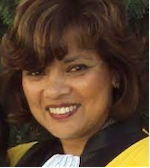 Born in Mozambique, Jesus Maria Sousa is Full Professor at the University of Madeira (UMa), Portugal. She has a PhD in Lettres et Sciences Humaines from the Université de Caen, France. She is currently Director of a Doctoral Programme in Curriculum and Pedagogical Innovation. With over one hundred publications (books and papers in national and international journals), she has supervised 20 doctoral theses and 50 master’s dissertations already finished. She is member of the Advisory Board of SPCE (Portuguese Society of Education Sciences); scientific advisor at AFIRSE (Association Francophone Internationale de Recherche Scientifique en Éducation), based in Paris; the representative of Portugal at the IAACS (International Association of Advanced Curriculum Studies), based in Vancouver; and member of RIAICES (Red Iberoamericana de Investigación sobre la calidad de la Educación Superior). She was also External Reviewer of Education programmes (Bachelors and Masters) in the Republic of Lithuania and in the Republic of Ireland. She was Director of the Research Center in Education, President of the Faculty of Social Sciences and Vice-Rector of UMa in the past years.
Born in Mozambique, Jesus Maria Sousa is Full Professor at the University of Madeira (UMa), Portugal. She has a PhD in Lettres et Sciences Humaines from the Université de Caen, France. She is currently Director of a Doctoral Programme in Curriculum and Pedagogical Innovation. With over one hundred publications (books and papers in national and international journals), she has supervised 20 doctoral theses and 50 master’s dissertations already finished. She is member of the Advisory Board of SPCE (Portuguese Society of Education Sciences); scientific advisor at AFIRSE (Association Francophone Internationale de Recherche Scientifique en Éducation), based in Paris; the representative of Portugal at the IAACS (International Association of Advanced Curriculum Studies), based in Vancouver; and member of RIAICES (Red Iberoamericana de Investigación sobre la calidad de la Educación Superior). She was also External Reviewer of Education programmes (Bachelors and Masters) in the Republic of Lithuania and in the Republic of Ireland. She was Director of the Research Center in Education, President of the Faculty of Social Sciences and Vice-Rector of UMa in the past years.
We can all agree we want to make our classes inclusive and accessible to diverse audiences. Despite the barriers we all know exist, the real problem is that we often focus more on the content we are teaching than the results we are creating.
Yet, we can agree it’s true that the more students can focus on the material, the more impact we have.
That’s why, to achieve the goal, we need to create teams of diverse student members. Here’s how—there are three steps:
Not only does that achieve the goal of making our classes more inclusive and accessible, it also prepares students for working in cross-cultural teams, and to innovate through cross-pollination of ideas. And it enhances the reputation of your department as one which serves a diverse set of students and thereby brings more applications for admission to your university from a broad range of students.
 Leslie Martinich, the founder of Competitive Focus, has motivated successful technology teams for over 20 years at IBM, Compaq, Novell, and several startup software companies. She led successful joint technology development efforts with Sun and Intel, and consulted with numerous small and large companies, including Freescale, 3M, Lek Pharmaceuticals, and Hewlett-Packard, on projects in the Americas, Europe, and Asia.
Leslie Martinich, the founder of Competitive Focus, has motivated successful technology teams for over 20 years at IBM, Compaq, Novell, and several startup software companies. She led successful joint technology development efforts with Sun and Intel, and consulted with numerous small and large companies, including Freescale, 3M, Lek Pharmaceuticals, and Hewlett-Packard, on projects in the Americas, Europe, and Asia.
She lectures at international conferences and executive education programs on topics in technology and technology management, such as "The Human Side of Innovation" and "Commercializing and Managing Innovation."
She is the lead instructor for the University of Texas Center for Lifelong Engineering Education's Engineering Leadership Institute.
Leslie has a bachelor’s degree in philosophy from the University of California at San Diego, a Master of Arts degree in Philosophy from The University of Texas at Austin, a Master of Science degree in Computer Sciences from The University of Texas at Austin, and certification from the Institute for Managerial Leadership at The University of Texas McCombs School of Business.
Leslie is on the Industrial Advisory Board for the Computer Science Department of Texas State University. She was a co-founder of the Austin Software Executives' Group. She is the past Vice President for Publications for the IEEE Technology Management Council.
The definition and aims of learning analytics remain an open question. One answer sees it ‘harnessing the power’ of data analytics to generate actionable insights, but it is often unclear what constitutes ‘actionable insight, or what its role is in human decision making. An increasingly important aspect of learning analytics is artificial intelligence, and recent thinking in this area provides new perspectives on actionable intelligence. Of particular importance is Brian Cantwell Smith’s distinction between reckoning and judgment, and Stuart Russell’s discussion how we control the systems that we build. In this keynote I will summarise some aspects of these ideas that are relevant to learning analytics and discuss their implications for the way that we conceptualise and use the results of data analysis that are presented as actionable insights.
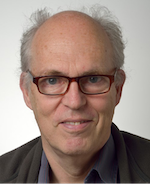 Dai Griffiths (also known as David) is a Senior Researcher at UNIR-iTED, at the International University of La Rioja, and holds a doctorate from Universitat Pompeu Fabra, Barcelona. He is Welsh, but has lived in Mallorca for most of his life, and his career has been split between Spain and the UK. His background is in the arts and in education, and in the early part of his career he taught at many levels including primary and secondary education, higher education and continuing education, and in industry. Since the early 1990s he has worked in the field of educational technology, working on a range focusing on various aspects of technology and education, as a developer, researcher and project manager, with learning design and learning analytics as recurring themes. For 10 years he was a Full Professor at the University of Bolton, focusing on developing an understanding of education by bringing together the areas of pedagogy, technology and organisational structure, inspired by the literature which emerged from the Cybernetics tradition. This line of work remains highly relevant in his present role at UNIR, a fully online University. Dai has been active in the field of learning analytics since its inception, and has written a number of papers analysing the implications of the use of data in education. In 2018 he received the Martin Wolpers Lifetime Award for achievement in the field of educational technology.
Dai Griffiths (also known as David) is a Senior Researcher at UNIR-iTED, at the International University of La Rioja, and holds a doctorate from Universitat Pompeu Fabra, Barcelona. He is Welsh, but has lived in Mallorca for most of his life, and his career has been split between Spain and the UK. His background is in the arts and in education, and in the early part of his career he taught at many levels including primary and secondary education, higher education and continuing education, and in industry. Since the early 1990s he has worked in the field of educational technology, working on a range focusing on various aspects of technology and education, as a developer, researcher and project manager, with learning design and learning analytics as recurring themes. For 10 years he was a Full Professor at the University of Bolton, focusing on developing an understanding of education by bringing together the areas of pedagogy, technology and organisational structure, inspired by the literature which emerged from the Cybernetics tradition. This line of work remains highly relevant in his present role at UNIR, a fully online University. Dai has been active in the field of learning analytics since its inception, and has written a number of papers analysing the implications of the use of data in education. In 2018 he received the Martin Wolpers Lifetime Award for achievement in the field of educational technology.
| 25 Oct 2021 | Abstract submission, Proposals for Special Sessions, Panels and Workshops |
| 05 Nov 2021 | Notification of Abstracts and Special Sessions acceptance |
| 12 Dec 2021 | EXTENDED - Complete paper upload for accepted abstracts (main conference) - Submission of complete papers for Special Sessions - Submission of Work-in-Progress and Student Poster Papers - Proposals for Panels and Workshops |
| 15 Jan 2022 | Notification of Acceptance |
| 10 Feb 2022 | Author registration deadline Camera-ready submission for all submission types |
| 28 Mar 2022 | Pre-conference Workshops |
| 29 Mar 2022 | Conference Opening |
| 31 Mar 2022 | Conference Closing |